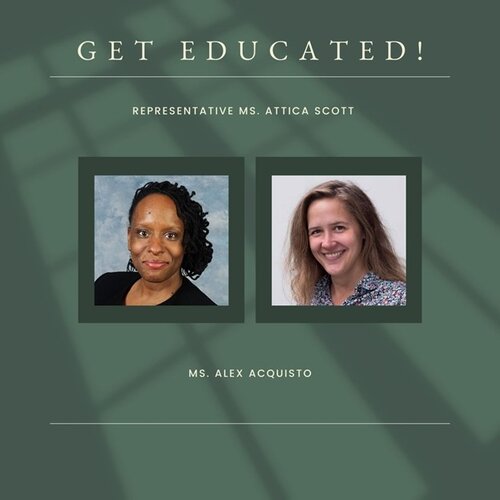Gender & Women’s Studies Hosts Reproductive Rights Panel “Get Educated!”
- Christina West
- Monday, February 28th, 2022

Around 50 guests joined a zoom panel discussion on reproductive rights policy in Kentucky on the evening of Thursday, Feb. 24. Representative Attica Scott and Lexington Herald Leader reporter Alex Acquisto discussed the current state of reproductive rights policy in Kentucky and described proposed laws that may be implemented soon. The purpose of the event was to inform individuals of current policies and how they may affect people, especially underrepresented groups.
“Get Educated!” was co-sponsored by Gender & Women’s Studies and the Department of Political Science and was made possible by the Gail B. Martin lecture Series and Catherine C. Ward Visiting Professorship funds. Gender & Women’s Studies (GWS) Coordinator Dr. Dawn Hall led and moderated the discussion.
To contextualize the situation, Acquisto first provided a timeline of reproductive policies from 2017 to the present day, describing the restrictive policies on abortion that continue to be implemented over time. In 2019, a trigger law was passed in Kentucky that could overturn Roe V Wade. Acquisto said, “If Roe versus Wade is overturned, which potentially could happen because we have a conservative Supreme Court, automatically it will make abortion illegal in the state.”
Representative Scott then stated many facts and statistics regarding the current state of medical access in Kentucky “There's a lack of access to OBGYN services in rural areas. Seventy-six of Kentucky's 170 counties currently have no OBGYN position whatsoever. None. And then we know that the maternal mortality rate in our state is more than double the national average,” Rep. Scott said.
Another bill in the works aims to ban abortion pills by mail. “That would be hugely consequential in Kentucky because right now, I think a little bit over half of the abortions performed each year are medical abortions by pill, and so it would have very far-reaching ramifications,” Acquisto stated.
Compounded with the distance many people drive to the two abortion clinics in Louisville, this bill would impact underrepresented populations that struggle to obtain medical care.
“In 1970, Kentucky had 17 health centers across the state that provided abortion care and now we have two,” Rep. Scott stated. Considering why these changes are happening, Rep. Scott said, “There are personal beliefs that people have that they bring to public policy and allow those personal beliefs to dominate, rather than have a broader perspective and say, what are we doing for the good of most people across our Commonwealth?”
The engaging conversation sparked a near-constant stream of questions and comments from virtual attendees. When asked what college students who are concerned about reproductive rights can do, the audience chimed in with their advice. The idea of joining campus organizations, such as the WKU Feminist Student Union,came up, along with attending more GWS events to stay informed on these topics.

